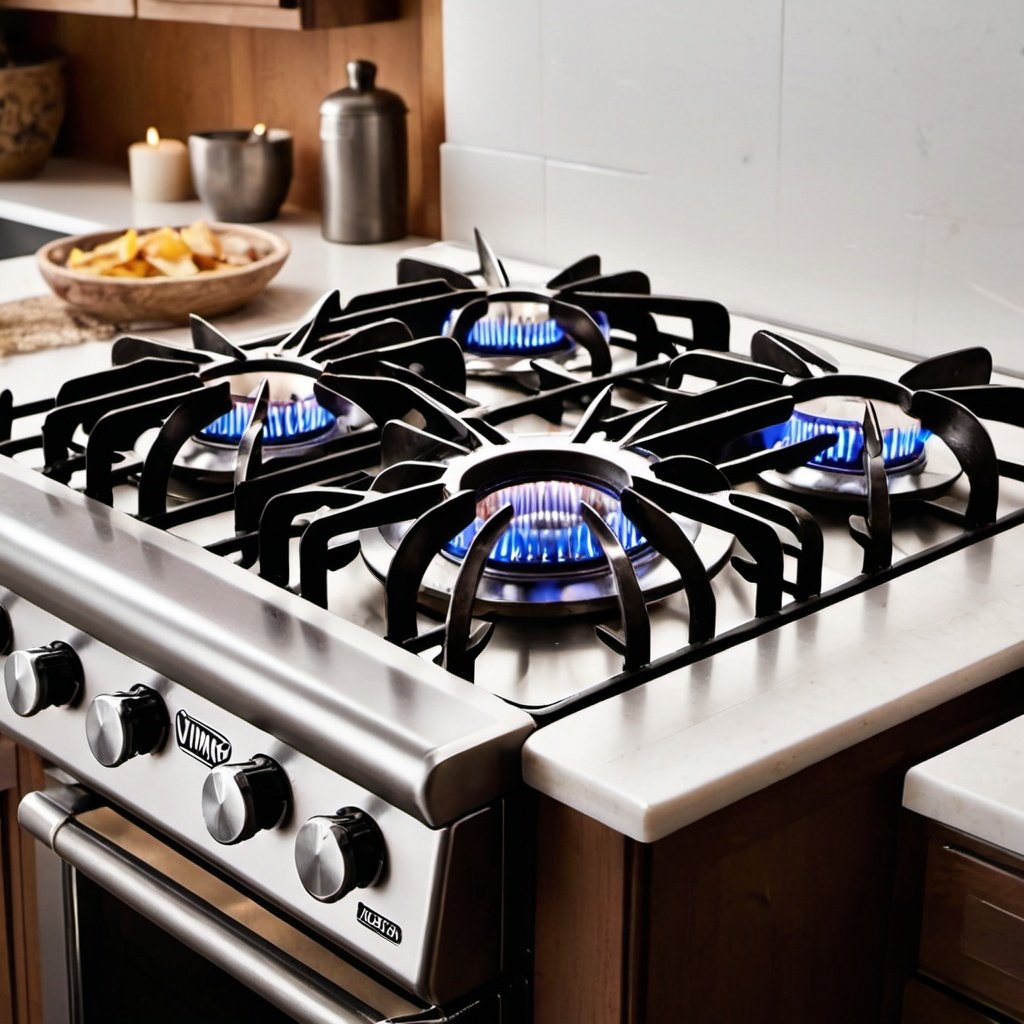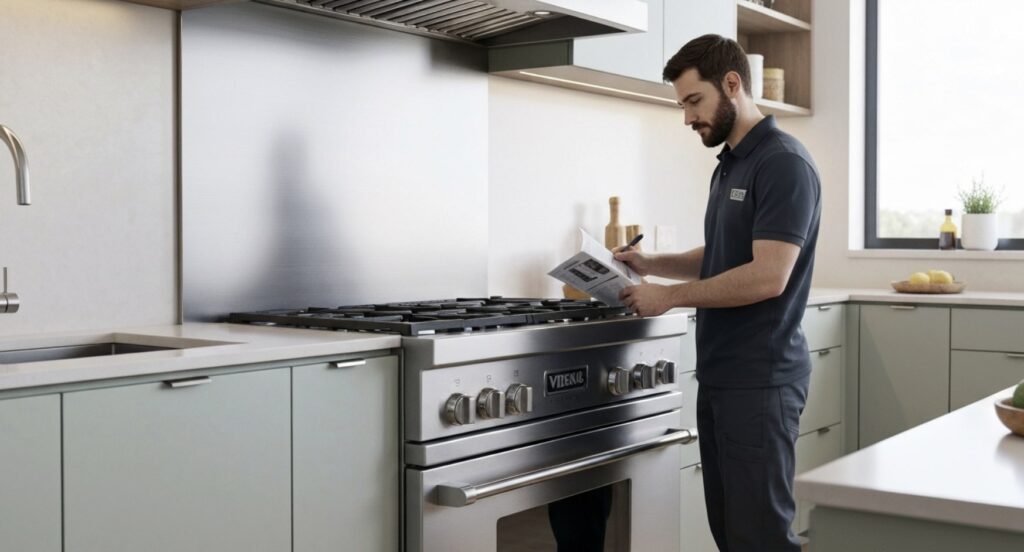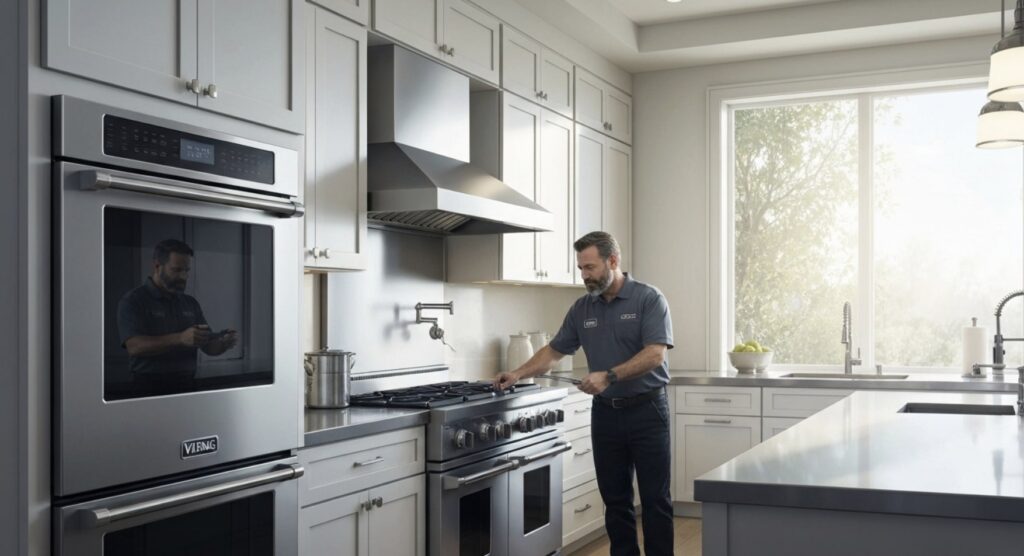When your Viking stove igniter fails to click, it can disrupt your cooking routine. Understanding the potential causes behind this issue is crucial to resolving it efficiently. From electrical problems to gas flow issues, including a potential gas supply issue, various factors can lead to a non-clicking igniter. This guide will delve into the common reasons behind this frustrating problem, empowering you to troubleshoot and resolve the issue promptly. Let’s explore the necessary steps to address your Viking stove igniter not clicking.
Top Reasons Why Your Viking Stove Igniter Isn’t Clicking
Viking cooking appliances, especially their stoves, are known for their reliability and performance, but even the best appliances can encounter issues over time. If your Viking stove igniter is not clicking, it could be due to a few common reasons.
Electrical Issues That Affect Igniters
An essential aspect often overlooked is the impact of power supply issues on igniters. Fluctuations or faulty wiring can disrupt the igniter’s ability to function correctly. Electrical surges might damage the spark module, leading to the igniter not clicking. Checking the circuit breaker and ensuring a stable power source is crucial in diagnosing this frustrating problem. To address electrical issues that can affect igniters, such as blown fuses, consider consulting an experienced technician familiar with Viking appliances for thorough troubleshooting solutions.
Gas Flow Problems and Their Impact on Ignition
Gas flow problems can hamper the ignition process of your Viking stove. A disruption in the gas supply can prevent the igniter from sparking correctly, leading to the stove not lighting up. It is crucial to ensure that there are no blockages in the gas line or valve that could impede the flow of gas to the burner and cooktop. Addressing gas flow issues promptly can help restore your stove’s functionality and ensure efficient operation.
The Effects of Dirt and Debris on Your Stove’s Igniter
Dirt and debris accumulation on your stove’s igniter can hinder its functionality, leading to ignition issues. When dirt clogs the igniter element or surrounding components, the electrical spark may not generate properly, resulting in the igniter not clicking. It is essential to regularly clean your igniter and its vicinity to ensure optimal performance and prevent such problems. Thorough cleaning using a soft scrub cleanser or soapy water, along with gentle scrubbing with a toothbrush, can help eliminate any buildup that may interfere with the igniter’s ability to spark.
DIY Troubleshooting Guide for Non-Clicking Igniters
If your Viking stove igniter isn’t clicking, follow this DIY troubleshooting guide to identify and address the issue.
Safety First: Preparing to Troubleshoot Your Stove
Before diving into troubleshooting your Viking stove igniter, prioritize safety. Always ensure the appliance is disconnected from the power source. Confirm the circuit breaker is switched off to prevent any electrical surges. Let the appliance cool down before proceeding; burner caps and grates may still be hot. Equip yourself with safety gear such as gloves and goggles. Gather necessary tools like a multimeter for electrical checks and a toothbrush for cleaning. By taking these precautions, you set a secure environment for inspection.
Step-by-Step Inspection of Electrical Connections
To start, ensure the stove is disconnected from the power source. Locate the igniter’s connection point on the spark module. Check for loose or damaged wiring, focusing on the ground wire. Inspect the circuit breaker for any tripped switches. Use a multimeter to test the continuity of the wiring. Clean any visible dirt or grease with pliers or a soft brush. Reconnect the wires securely. Restore power and test the igniter. If the issue persists, consider seeking professional appliance repair assistance.
How to Clean Your Igniter and Surrounding Area
To clean your igniter and surrounding area, start by ensuring the power supply is off. Use a soft scrub cleanser or soapy water to remove stubborn stains. Gently scrub with a paper towel or toothbrush to avoid damaging the igniter element. For tougher stains, you can use a cleaner specifically designed for stovetops. Clear any grease or buildup carefully using metal tools. Be cautious around electrical components. Thoroughly dry the area before restoring power. Regular cleaning helps maintain your Viking stove’s performance. Remember safety measures and consult an experienced technician if needed.
Testing Gas Flow to Your Viking Stove Burners
To test the gas flow to your Viking stove burners, ensure the appliance is off. Remove burner caps and grates. Turn on a burner and listen for the gas hissing sound. If there’s no sound, check the gas line and valve for any blockages or leaks. Use soapy water to detect leaks – bubbles will form at leak points. Confirm there’s a steady gas supply before proceeding with any further troubleshooting steps.
When to Call a Professional for Your Viking Stove
Not all issues with your Viking stove can be resolved through DIY methods. If you encounter complex problems like persistent ignition failures despite troubleshooting, suspected gas line issues, or faulty wiring, it’s time to seek assistance from an experienced technician specializing in Viking appliance repair. Professional intervention is crucial when facing difficulties beyond the scope of basic maintenance or troubleshooting, such as a broken knob shaft. Ignoring such issues can lead to safety hazards and further damage to your appliance, so prompt professional attention is advised.
Identifying Issues Beyond DIY Repair
If your Viking stove igniter isn’t clicking, some troubleshooting fixes are available. However, certain issues may require professional repair. Persistent staining on the igniter or components might indicate a deeper problem, such as malfunctioning burner igniters, that is best handled by a trained technician. If cleaning doesn’t help, seek professional assistance. Complex issues with the electrical or gas systems should also be addressed by a professional for safe and accurate repairs.
Benefits of Professional Repair vs. DIY Fixes
For Viking stove igniter issues, professional repair offers expertise, specialized tools, and warranties for peace of mind. Opting for a professional ensures accurate diagnosis, effective solutions, and use of specific tools to prevent further damage.
Preventive Maintenance Tips for Viking Stove Owners
Proper preventive maintenance can go a long way in ensuring the optimal performance and longevity of your Viking stove. Here are some essential preventive maintenance tips for Viking stove owners:
- Regularly clean your stove, including the burners, burner caps, and igniter, to prevent the buildup of grease and debris that can affect its functionality.
- Use gentle cleaning agents and avoid abrasive tools to avoid damaging the components of your stove.
- Schedule professional inspections at least once a year to identify any potential issues and ensure that your stove is in good working condition.
- Take note of any unusual smells, sounds, or performance issues and address them promptly to prevent further damage.
- Follow the manufacturer’s guidelines for maintenance and care to ensure that you’re taking the necessary steps to keep your Viking stove in top shape.
Conclusion
In conclusion, understanding the complexities of your Viking stove’s igniter is crucial for proper maintenance. From electrical issues to gas flow problems and debris accumulation, being aware of the potential causes behind a non-clicking igniter empowers you to troubleshoot effectively. While DIY fixes are possible, knowing when to seek professional assistance is equally important to ensure the longevity of your stove. Regular preventive maintenance, such as cleaning and professional inspections, can go a long way in preserving the performance of your Viking stove. For more information on specific issues related to your Viking range, check out our comprehensive troubleshooting guide: The Ultimate Guide to Viking Range Cleaning Service.
Frequently Asked Questions
Why is my Viking stove igniter clicking but not lighting?
If your Viking stove igniter is clicking but not lighting, it could indicate a few possible issues. One potential cause is a problem with the gas line. Ensure that the gas supply to the stove is turned on and that there are no blockages in the gas line.
Another possible cause is a faulty electrical spark. The igniter generates a spark to ignite the gas, and if the spark is weak or nonexistent, the gas won’t light. In this case, the igniter may need to be cleaned or replaced.
If you’re unsure of the cause or unable to fix the issue yourself, it’s best to contact a professional appliance repair service for assistance.
How often should I clean my Viking stove igniter?
Regular cleaning of your Viking stove igniter is essential to maintain its proper functioning. It’s recommended to clean the igniter at least once every few months or as needed. This will help prevent the buildup of grease or debris that can affect its performance. Use a toothbrush or compressed air to gently clean the igniter, and ensure that it’s completely dry before reassembling the stove.
Can moisture cause my Viking stove igniter to stop clicking?
Yes, moisture can potentially cause your Viking stove igniter to stop clicking. If there is moisture present on or near the igniter, it can interfere with the electrical spark and prevent it from generating a spark. Ensure that the area around the igniter is dry before attempting to use the stove.
What are the signs that my Viking stove igniter needs replacement?
There are a few signs that indicate your Viking stove igniter may need replacement. If the igniter is physically damaged or shows signs of wear and tear, such as cracks or breaks, it’s a clear indication that it needs to be replaced. Additionally, if you’ve tried cleaning and troubleshooting the igniter but it still doesn’t click, it may be time to consider replacing it. Contact a professional appliance repair service for assistance with igniter replacement.







